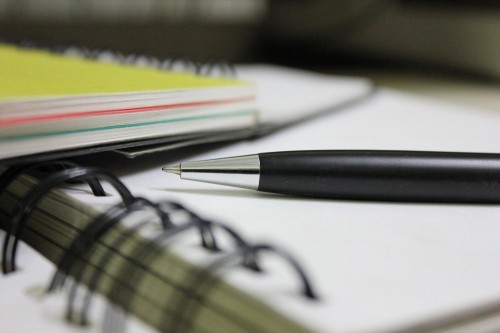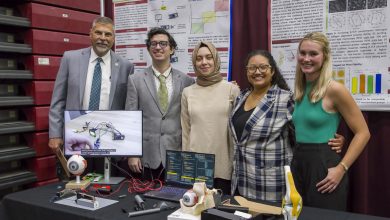College Supplies for First-Year Students
At college, it’s rare for first-year students to get a list of supplies for each class. Most of the time, professors will note additional supplies on the syllabus and make recommendations on the first day of classes, but that’s not much help for the student who arrives on campus for Orientation and wants to be prepared before the first day. Luckily, there are some common college supplies that students can get before the first day of class to make their academic transition as easy as possible.
Planner – many students use the calendars on their phones, and that’s great, but it’s a good idea to keep a paper calendar with due dates, key assignments, and important deadlines. Give yourself time during the day to transfer the written appointments to your phone, but write them first. We remember more of what we write by hand than what we type (more reading and fine motor skills involved in handwriting) so get a planner that you can keep with you. Start by writing down the key deadlines from each of your syllabi during the first week.
Pens and pencils – this should be a no-brainer, but you would be surprised by how many students who come to class without a pen or a pencil. Get pens and pencils that are comfortable for writing, and have pens in more than one color. Those four-color pens that were so cool in elementary school can come in handy when making notes and corrections by hand. Get an extra pack to tuck into your desk in your room so you don’t sabotage your backpack supply for your room supply. If you plan to study a lot in a place other than your room, make sure to get a small pencil bag so you’re not hunting through the bottom of your bag for a writing utensil.
Highlighters – not just for making your page pretty colors, highlighters can be very helpful when taking notes or following along with the instructor during a lecture. During the first class, you can highlight key parts of the syllabus like dates of exams and big projects. If you take notes by hand, you can highlight your notes when studying to bring attention to key points that the instructor stresses during a lecture. Highlighters can be used on a textbook, but that isn’t always a good idea if you plan to sell back a textbook. That’s why you should always get…
Post-It Notes – the best-kept study secret ever, in this academic’s professional opinion. Using Post-It notes to flag key passages in a textbook or to write down study questions saves you from marking up your textbook. Post-It notes are also very handy for making little notes about things you need to remember. Sticking a Post-It on the door or the fridge helps to jog your memory about remembering that particular book or how you’re out of orange juice.
Flash drive – an important school supply for students on our high tech campus. Having a flash drive allows you to save research at the library that you’ve downloaded (most articles you need can be saved as PDFs) and back up your assignments that you’ve saved to your hard drive. These days, it’s possible to get a few gigs of storage for under $20 that will fit in your pocket. If you’re in a major where you will do a lot of design work or programming, you might consider a larger external hard drive with a terrabyte of storage. These can be expensive, but you’ll have plenty of space to back up your files.
Loose-leaf paper – depending upon how you usually take notes, you may want loose-leaf paper and a binder with dividers or several notebooks. You may take all of your notes electronically, but having some paper for drawing up concept maps and jotting down outlines is still a smart idea. Having loose-leaf paper lets you organize and file notes from semester to semester, while notebooks keep things separate and tidy. The added bonus to loose-leaf is the ability to insert handouts from the class in line with your notes. Consider your note-taking style and the needs of the class before committing to one style over another. What you did in high school may not work in college.
Stapler – the most requested item in our office. Students are always asking to borrow our stapler for their reports. Get two, one to keep in your room and one little stapler to keep in your backpack. It’s great to print out the paper to turn in, but it’s better when you can staple it afterward rather than find an office manager willing to lend you that magical stapling machine.
Binder clips – so many uses, and so underutilized! Binder clips are great for holding stacks of returned work together or keeping handouts with the notebook for a class. Binder clips can be better than staples if you have to turn in a large report, and a binder clip plus a thumbtack lets you hang up a list or sign-up sheet.
Whiteboard/bulletin board – overlooked but rarely underused in the residence hall, a whiteboard lets you make notes and reminders, leave messages, and gives you space to draw outlines for studying. Getting one with a bulletin board lets you add important fliers, calendars, coupons, reminders, and photos. Try and hang it in a place where you can stand up to write; moving and writing on the board can help you when studying by involving more muscles in your body.
Power strips (with surge protection) – essential when you have items that need to charge overnight. Surge protection is important in Florida; protect your electronics rather than lose them in the middle of a bad storm or power failure. Some strips now allow you to plug in a USB cable directly rather than use an AC adapter. Consider the devices that your have and the layout of your room, and get a few so you’re not twisting behind furniture to keep your devices powered.
Water bottle – healthy and convenient, especially since the water on campus is just fine. Get a water bottle to save on bottled water and fill up at the water fountains around campus. It gets hot during the day, and water is better (and cheaper) than getting a soda. Just make sure that you wash the water bottle every so often to keep it from getting moldy. Ew.
A good backpack – essential when walking across campus. Get one that will last, that is comfortable, that will fit your personal style, and that will keep your materials safe. If you carry a laptop, get a bag that has a padded area for your electronics. Don’t rely on the freebie tote bags that you pick up during the first week, but save them for the beach or the gym.





